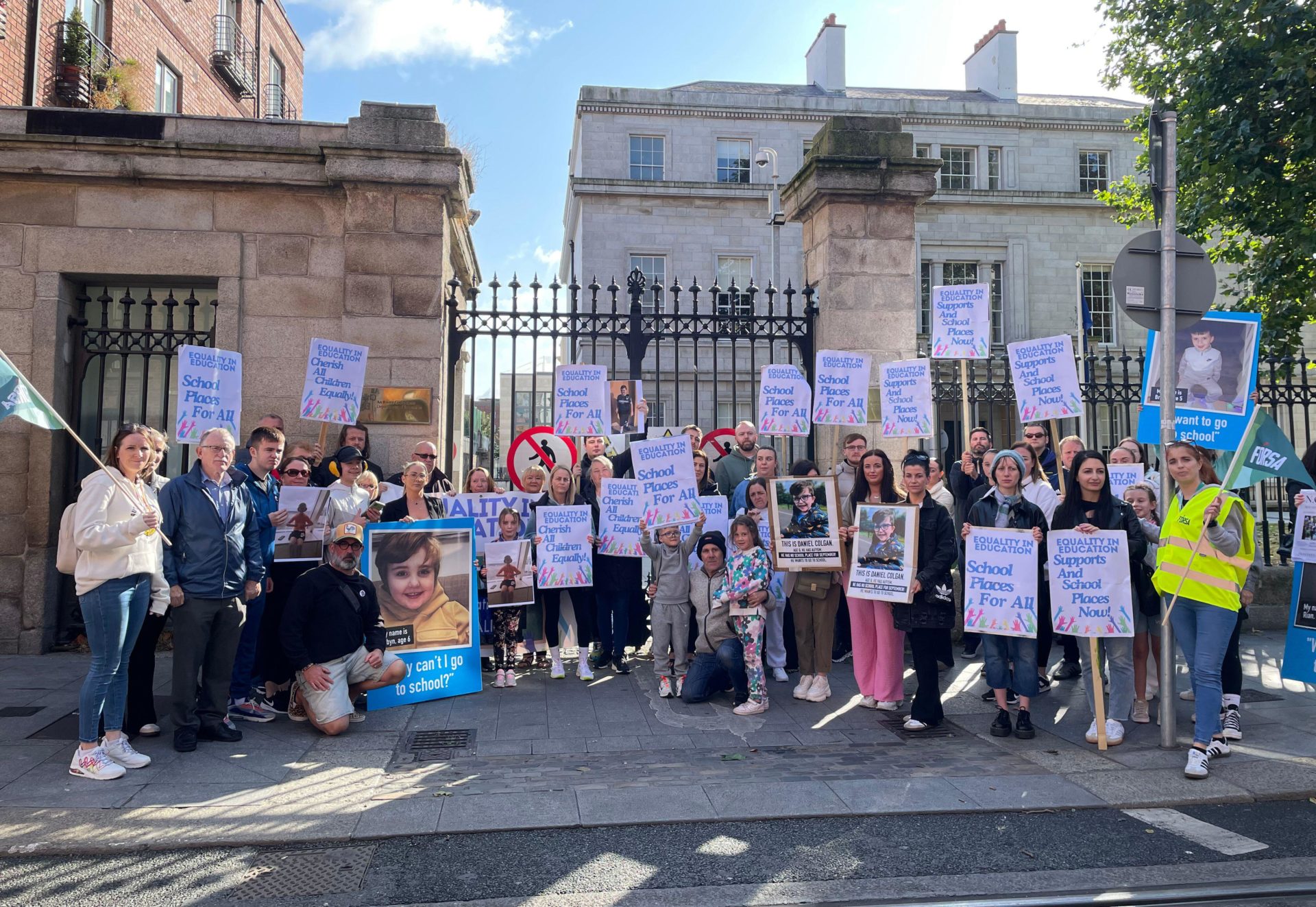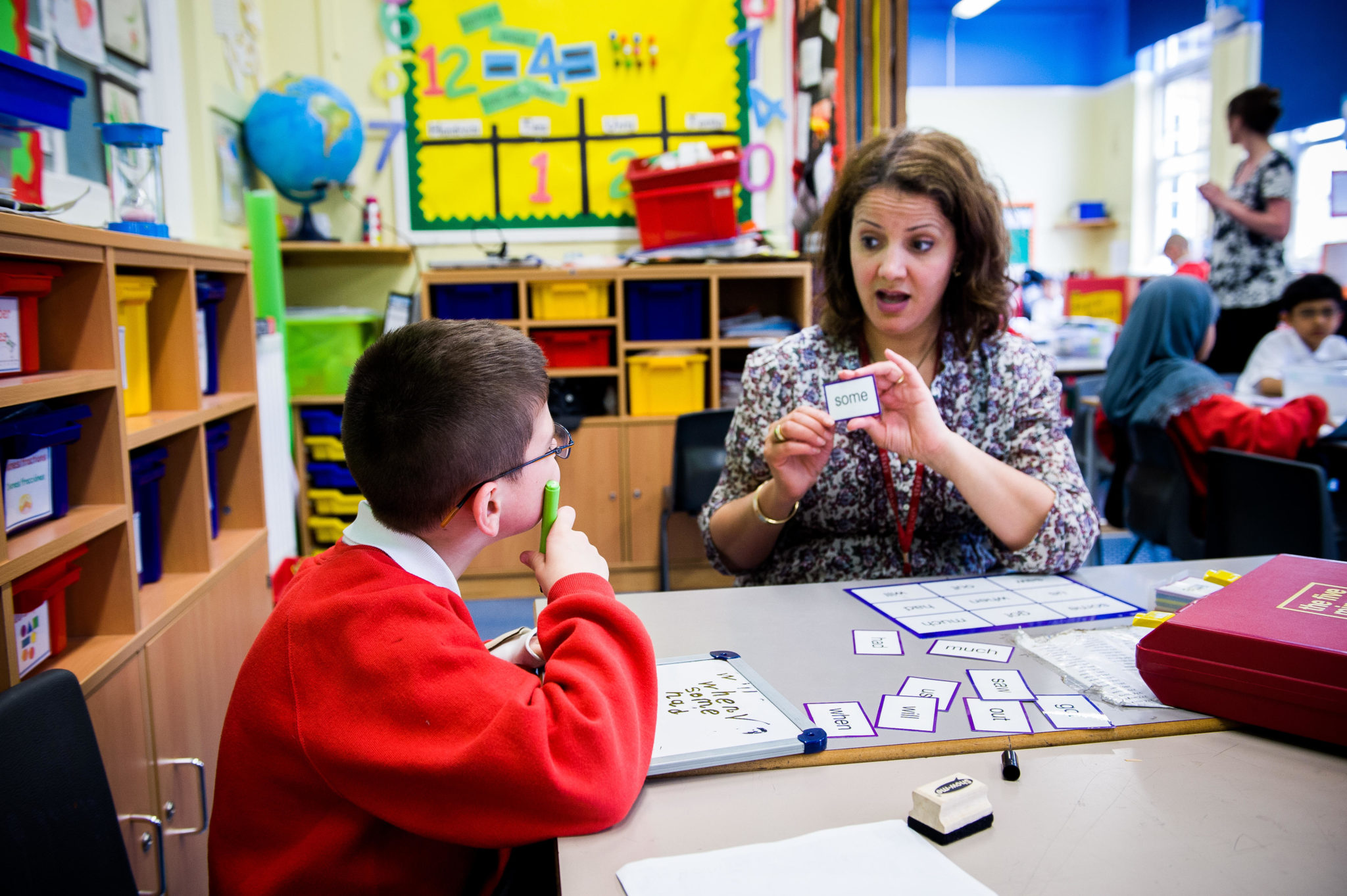Norma Foley spent her Friday doing a whistle-stop tour of her native Kerry, as Leaving Cert students in the county finally received their results.
In the lead-up to this, the Education Minister has been pushing the idea of banning smartphones in schools, citing the harms that social media and cyberbullying can cause for children.
It's not a bad idea.
I went to school as camera phones were first emerging and while, from my recollection at least, nothing sinister happened, the fact that all our lives are now centred around a pocket-sized device is definitely concerning.
Meanwhile, the rise of cyberbullying needs to be urgently addressed by parents and schools alike.
With just days to go before the new academic begins, however, many parents are still struggling to find their children a school place.
 Parents, activists and special needs assistants protest outside the Department of Education in Dublin, 23-08-2024. Image: Grainne Ni Aodha/Alamy
Parents, activists and special needs assistants protest outside the Department of Education in Dublin, 23-08-2024. Image: Grainne Ni Aodha/AlamyWhile Minister Foley was travelling around her home county on a pre-election Leaving Cert results day tour, a group of parents of children with additional needs were protesting outside the Department of Education in Dublin City.
These are parents of some of the country’s most vulnerable children and the worry, stress and tension they face as they try to secure their children’s basic right to an education is heartbreaking to see.
It is safe to say that banning smartphones in schools is the least of their concerns.
In my opinion, smartphones should be well down the priority list of the Government – especially one led by a Taoiseach who has set up a unit devoted to improving special education in his own Department.
“It is shameful … where is Simon Harris? Why isn’t he here?”
Parents march on the Department of Education demanding school places for their children with additional needs.
— NewstalkFM (@NewstalkFM) August 23, 2024
All of those parents outside the Department of Education on Friday morning had children with autism and sometimes other, very complex, additional needs.
None of those children have a school place with just days to go before the new academic year.
I know exactly what Education Minister Norma Foley would say.
She would highlight the work undertaken by Government to date in finding extra school places for students with additional needs.
Over 3,300 classes are in the system, two-thirds of which were introduced in the lifetime of this government.
Meanwhile, 11 extra special schools are coming on stream, alongside the additional Special Needs Assistants that come with them.
Wits' end
All of those points are worthy of credit and praise; however, that does nothing for the parents I spoke to, who are at their wits' end trying to find a place for their children.
Charlotte Cahill told me she has applied to 32 schools for her daughter Cyra, who has autism, epilepsy and pathological demand avoidance.
“I have been told that because her needs are so complex, I may just have to accept putting her into a school that doesn’t suit her needs,” she said.
Charlotte is not alone.
All of the parents spoke to me about how much routine matters for children with additional needs.
I know this myself from my own family experience, but sometimes these parents feel like they’re talking to a wall when trying to explain why routine matters.
“Every morning this Summer, [Cyra] would come down the stairs, grab her schoolbag and indicate that she wants to go to school,” Charlotte said.
“I try to explain to her that it’s not time to go to school and she will hit me, or hit herself and it takes a lot to come back from that.”
Regression
This is during the Summer holidays when all parents have to try and adapt as much as possible so their children’s routines aren’t compromised too much.
Now, however, the likes of Charlotte and Cyra will have to go through this every day, because Cyra does not have a safe, controlled environment where she can develop her skills – and where she is comfortable spending part of her day.
“Regression” is often the word used when I ask parents about the impact being left without a school place has had on their children.
 File photo of a learning support worker with a child with special needs in a London classroom. Image: Alamy
File photo of a learning support worker with a child with special needs in a London classroom. Image: AlamyIt's very much the same for Nicola O’Dea, whose 13-year-old son Sean also has autism.
He is due to start secondary school in a matter of days – but Nicola hasn’t been able to find a place for him despite applying to 15 schools over the summer.
Nicola said she has had to give up her job to care for Sean at home – but she notes that there is “only so much a parent can do” when it comes to giving him the education and supports he needs.
“Home and school are two separate things for Sean,” she said.
“When Sean’s at home, it’s playtime, it’s iPad time - he doesn’t associate home with schoolwork.
“He wouldn’t do work for a home tutor because that’s not what the home is for.
“He will regress if he isn’t going to get that support, that structure, that routine.”
Assessment of need
Alarmingly, another one of the parents I spoke to, Mandy Scanlan, said her 5-year-old daughter Paige has been waiting four-and-a-half years just to get an assessment of need.
Assessments of need are absolutely essential for any child with a disability – carried out to identify a child's needs and what health services must be sought to address them.
Back in March, Sinn Fein’s health spokesperson David Cullinane obtained figures which found there were 8,900 children on a waiting list to get an assessment of need.
In Mandy’s case, her family has now been waiting around 90% of Paige’s life just to take that first step towards accessing the care she so desperately needs.
While the ban on smartphones is a good idea, when you hear from these families who are struggling to get the care and education their children need, it becomes something that isn’t really that important at all.
I really feel that what is needed now is an all-guns-blazing approach from the Government to ensure every child has a place.
Yes, they’ve had some success in establishing special schools and classrooms but the fact is, they started from an extremely low base – and for those parents still waiting, it’s nowhere near enough.









